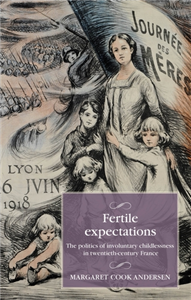Fertile expectations
The politics of involuntary childlessness in twentieth-century France
by Margaret Cook Andersen
Description
More Information
Rights Information
Albania, Algeria, Angola, Argentina, Armenia, Australia, Austria, Bahrain, Belgium, Belize, Benin, Bolivia, Bosnia and Herzegovina, Botswana, Brazil, Bulgaria, Burkina Faso, Burundi, Cameroon, Canada, Cape Verde, Central African Republic, Chad, Chile, China, Colombia, Comoros, Congo [DRC], Congo, Republic of the, Costa Rica, Ivory Coast, Croatia, Czech Republic, Denmark, Djibouti, Ecuador, Egypt, El Salvador, Equatorial Guinea, Eritrea, Estonia, Ethiopia, Faroe Islands, Finland, France, French Guiana, Gabon, Gambia, Georgia, Germany, Ghana, Greece, Guatemala, Guinea, Guinea-Bissau, Guyana, Honduras, Hongkong, Hungary, Iceland, India, Indonesia, Iran, Iraq, Ireland, Israel, Italy, Japan, Jordan, Kazakhstan, Kenya, Kuwait, Latvia, Lebanon, Lesotho, Liberia, Libya, Lithuania, Luxembourg, Macau, China, Macedonia [FYROM], Madagascar, Malawi, Malaysia, Mali, Malta, Mauritania, Mauritius, Mayotte, Mexico, Mongolia, Montenegro, Morocco, Mozambique, Namibia, Netherlands, New Zealand, Nicaragua, Niger, Nigeria, Norway, Oman, Pakistan, Panama, Paraguay, Peru, Philippines, Poland, Portugal, Puerto Rico, Qatar, Reunion, Romania, Russia, Rwanda, Saint Helena, Sao Tome and Principe, Saudi Arabia, Senegal, Serbia, Seychelles, Sierra Leone, Singapore, Slovakia, Slovenia, Somalia, South Africa, South Korea, Spain, Sri Lanka, Sudan, Suriname, Swaziland, Sweden, Switzerland, Syria, Taiwan, Tanzania, Thailand, Timor-Leste, Togo, Tokelau, Tunisia, Turkey, Uganda, Ukraine, United Arab Emirates, United Kingdom, United States, Uruguay, Venezuela, Vietnam, Western Sahara, Yemen, Zambia, Zimbabwe, South Sudan, Cyprus, Palestine, Bangladesh, Cambodia, Liechtenstein, Azerbaijan, Jamaica, Kyrgyzstan, Dominican Republic, Myanmar, Monaco
Endorsements
An engaging history of motherhood, demography, and infertility in twentieth-century France, this book explores fraught political and cultural meanings attached to the notion of an "ideal" family size. When statistics revealed a steady decline in the birthrate, concerned citizens feared France was facing depopulation. Pronatalist activists pushed for financial benefits, propaganda, and punitive measures designed to increase the birthrate. Motherhood figured prominently in political and medical discussions of fertility. Pronatalists blamed women for allegedly opting for smaller families or choosing a childfree existence, in defiance of the nation's demographic needs. This book situates involuntary childlessness within this discussion of motherhood and demography. Then, as now, many French women and men experienced fertility troubles when trying to begin or expand a family. In rich detail, the author explores these intimate struggles during a time when pronatalist propaganda presented small families and childless households in a negative light. The early to mid-twentieth century was also a period marked by innovations in fertility medicine, growing cultural awareness of artificial insemination by donor, and changing laws and cultural norms surrounding child adoption. These practices offered new ways of responding to suspected or confirmed infertility and formed part of a growing expectation of being able to control one's fertility and family size. This book presents the political and cultural context necessary for understanding why private questions about when to start a family, how many children to have, and how to cope with involuntary childlessness, evolved and became part of state efforts to encourage population growth.
Reviews
An engaging history of motherhood, demography, and infertility in twentieth-century France, this book explores fraught political and cultural meanings attached to the notion of an "ideal" family size. When statistics revealed a steady decline in the birthrate, concerned citizens feared France was facing depopulation. Pronatalist activists pushed for financial benefits, propaganda, and punitive measures designed to increase the birthrate. Motherhood figured prominently in political and medical discussions of fertility. Pronatalists blamed women for allegedly opting for smaller families or choosing a childfree existence, in defiance of the nation's demographic needs. This book situates involuntary childlessness within this discussion of motherhood and demography. Then, as now, many French women and men experienced fertility troubles when trying to begin or expand a family. In rich detail, the author explores these intimate struggles during a time when pronatalist propaganda presented small families and childless households in a negative light. The early to mid-twentieth century was also a period marked by innovations in fertility medicine, growing cultural awareness of artificial insemination by donor, and changing laws and cultural norms surrounding child adoption. These practices offered new ways of responding to suspected or confirmed infertility and formed part of a growing expectation of being able to control one's fertility and family size. This book presents the political and cultural context necessary for understanding why private questions about when to start a family, how many children to have, and how to cope with involuntary childlessness, evolved and became part of state efforts to encourage population growth.
Author Biography
Margaret Andersen is an Associate Professor of History at the University of Tennessee
Manchester University Press
Manchester University Press is a leading UK publisher known for excellent research in the humanities and social sciences.
View all titlesBibliographic Information
- Publisher Manchester University Press
- Publication Date May 2025
- Orginal LanguageEnglish
- ISBN/Identifier 9781526177360 / 1526177366
- Publication Country or regionUnited Kingdom
- FormatPrint PDF
- Pages328
- ReadershipGeneral/trade; College/higher education; Professional and scholarly
- Publish StatusPublished
- Dimensions216 X 138 mm
- Biblio NotesDerived from Proprietary 6196
- SeriesStudies in Modern French and Francophone History
- Reference Code16372
Manchester University Press has chosen to review this offer before it proceeds.
You will receive an email update that will bring you back to complete the process.
You can also check the status in the My Offers area

Please wait while the payment is being prepared.
Do not close this window.



